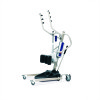Invacare RPS350-2 Owners Manual - Page 20
Transferring to a Wheelchair, Transferring to a Bed, Otherwise, injury may result.
 |
View all Invacare RPS350-2 manuals
Add to My Manuals
Save this manual to your list of manuals |
Page 20 highlights
SECTION 5-TRANSFERRING THE PATIENT Transferring to a Wheelchair NOTE: For this procedure, refer to FIGURE 5.2. 1. Ensure the legs of the lift with the patient in the sling are in the open position. Press the open button on the hand control until the legs are in the maximum open position. 2. Move the wheelchair into position. Refer to Detail "A". 3. Engage the rear wheel locks of the wheelchair to prevent movement of the wheelchair. Refer to Detail "B". ƽ WARNING DO NOT place the patient in the wheelchair if the locks are not engaged. The wheelchair wheel locks MUST be in a locked position before lowering the patient into the wheelchair for transport. Otherwise, injury may result. 4. Position the patient over the wheelchair. 5. Lower the patient into the wheelchair. 6. Unhook the sling from all attachment points on the lift. Refer to Detail "C". 7. Instruct patient to lift their feet off the footplate. Assist the patient if necessary. 8. Remove the sling from around the patient. 9. Pull the lift away from the wheelchair. Transferring to a Bed NOTE: For this procedure, refer to FIGURE 5.3. NOTE: The lower center of gravity provides stability making the patient feel more secure and the lift easier to move. NOTE: The lift arms will stay in position until the DOWN button on the hand control is pressed. 1. Position the patient as far over the bed as possible. NOTE: If patient is being transferred from a surface that is lower than the bed, raise the patient above the surface of the bed. The patient should be elevated just high enough to clear the bed with their weight fully supported by the lift. 2. Press the DOWN button and lower the patient onto the bed. ƽ WARNING Invacare recommends locking the rear swivel casters ONLY when positioning or removing the sling from around the patient. 3. Lock the rear swivel casters on the stand up lift. 4. Unhook the sling from all attachment points on the lift. 5. Instruct the patient to lift their feet off of the footplate. Assist the patient if necessary. 6. Remove the standing or transport sling from around the patient. 7. Unlock the rear swivel casters and pull the lift away from the bed. Stand Up Patient Lift 20 DETAIL "A" DETAIL "B" DETAIL "C" FIGURE 5.2 Transferring to a Wheelchair FIGURE 5.3 Transferring to a Bed Part No. 1145811















